How Libraries Celebrate Human Rights Across the World
“10 December 2018 marks the 70th anniversary of the Universal Declaration of Human Rights. It is an opportunity to read, and reflect on, a document that includes many of the key values – and missions – of libraries in advancing human rights for all. What do these rights mean and what is their impact on today’s world? https://www.ifla.org/publications/node/91749
IFLA Secretary General, Gerald Leitner, has asked libraries worldwide to share what they are doing to celebrate this event; you can find some examples below.
These examples reflect a variety of answers that show how libraries nowadays are not only agents of freedom of information and access but iconic representations of the societal commitment to achieve a better world.
In the meantime, IFLA started the celebration a week ago with daily blogs to highlight the work of libraries on those rights of the Declaration directly connected to the work of libraries. You can read more on IFLA’s Policy and Advocacy Blog.
UNESCO
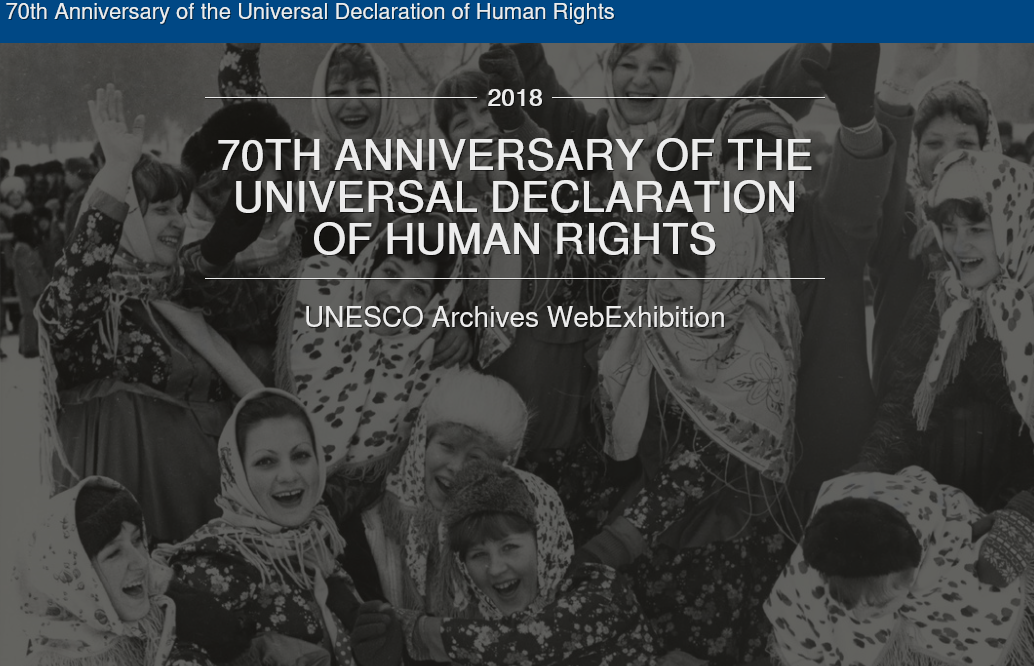
To mark the 70th Anniversary of the Universal Declaration, UNESCO’s Library and Archives division have prepared a web exhibition on human rights to be displayed on the platform of their Digitisation Project. UNESCO is sharing the selection of recently digitised photographs from its collection. Starting with David Seymour’s pictures of ruins, the selection shows activities in the various fields of the Organization over the years.
The promotion and protection of human rights occupies a central place in the history and mandate of UNESCO. Seventy years ago, its founders sought to define the conditions of lasting peace – not only in agreements between States, but also in the intellectual and moral solidarity of mankind, grounded on human dignity. This quest remains just as relevant today, with continuing economic hardship, armed conflicts and tension between communities leading to renewed manifestations of intolerance and exclusion.
UNITED NATIONS
To celebrate the 70th anniversary of the adoption of the UDHR, the United Nations Dag Hammarskjöld Library reflects both on the validity of the provisions of the Universal Declaration and on their relation with the world we live in today. The exhibit presents thirty key documents, each one expanding on and illustrating the specific human rights and fundamental freedoms proclaimed in each individual article comprising the Declaration.
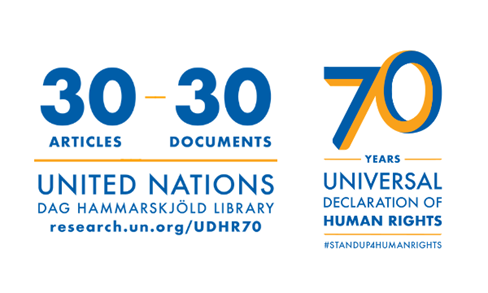
Documents include well-established international instruments adopted decades ago, but also more recent reports that may not be so widely known. The exhibit presents them in sometimes unusual and surprising contexts, thereby inviting “visitors” to reflect upon and deepen their insights into the meaning of human rights in today’s globalized world.
The documents highlighted in this exhibit point to the tremendous progress achieved, as well as to current challenges in the human rights arena: the protection of the rights of migrants and refugees, the right to a clean environment as a prerequisite for the enjoyment of other rights, tax abuse and modern forms of slavery as violations of human rights, or the obligation to remove obstacles in society that prevent persons with disabilities from fully enjoying their rights on an equal footing with others.
The exhibit suggests that the Declaration is indeed a living document and that, in the words of the High Commissioner for Human Rights, “…human rights are not impractical philosophical ideals. They are sound policy choices, which build strong, economically healthy, secure and peaceful societies.”
AUSTRALIA
The Australian Library and Information Association (ALIA) has organized a series of events and activities at libraries across Australia. ALIA CEO Sue McKerracher explained: “We have built a relationship with the UN Association of Australia through ALIA’s work on the UN Sustainable Development Goals, and we were pleased to put UNAA in touch with libraries for this special day. What better place to host a celebration of human rights than our State and National Libraries?”
CROATIA
To mark the 70th Anniversary of the Universal Declaration of Human Rights 2018, the Department of Information Sciences in Osijek (Croatia) is working with undergraduate students, through reading and discussion, about the importance of human rights in the context of free access to information.
NAMIBIA
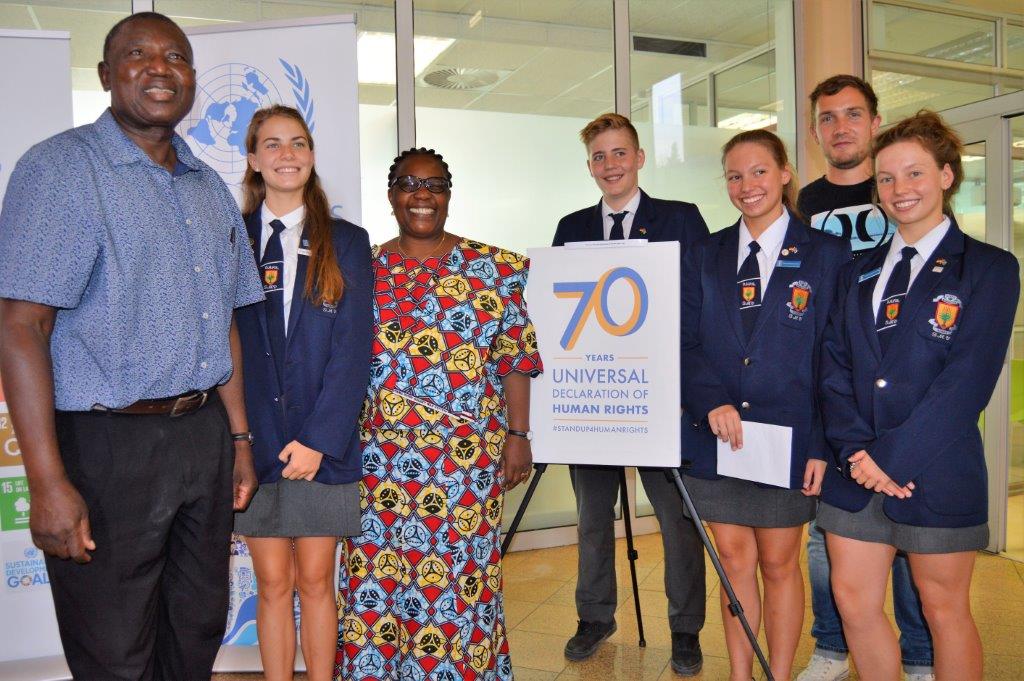
The Human Rights & Documentation Centre (HRDC), Faculty of Law, University of Namibia (UNAM), in collaboration with the United Nations Information Centre (UNIC), Windhoek officially hosted a week-long photo exhibition on the 70th Anniversary of the Adoption of the Universal Declaration of Human Rights on Tuesday, 20 November 2018.
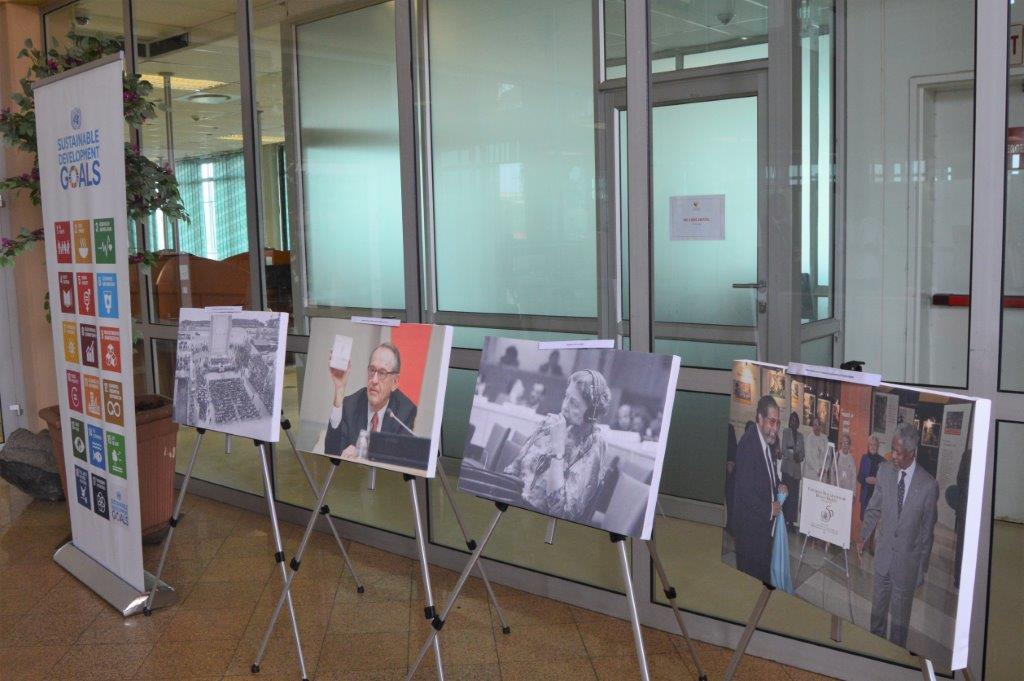
Prof. John Baloro, Dean of the Faculty of Law officially launched the exhibition, touching on the importance and the long-cherished dream of human rights. Ms. Ritva Niskala, the Deputy University Librarian extended a very warm welcome to all participants and Dr. Chiku Mnubi-Mchombu, Coordinator of the Human Rights Documentation Centre provided a significant overview on the role of documentation in promoting human rights. Ms. Anthea Basson, National Information Officer of UNIC Windhoek concluded with a briefing about the photo exhibition.
NIGERIA
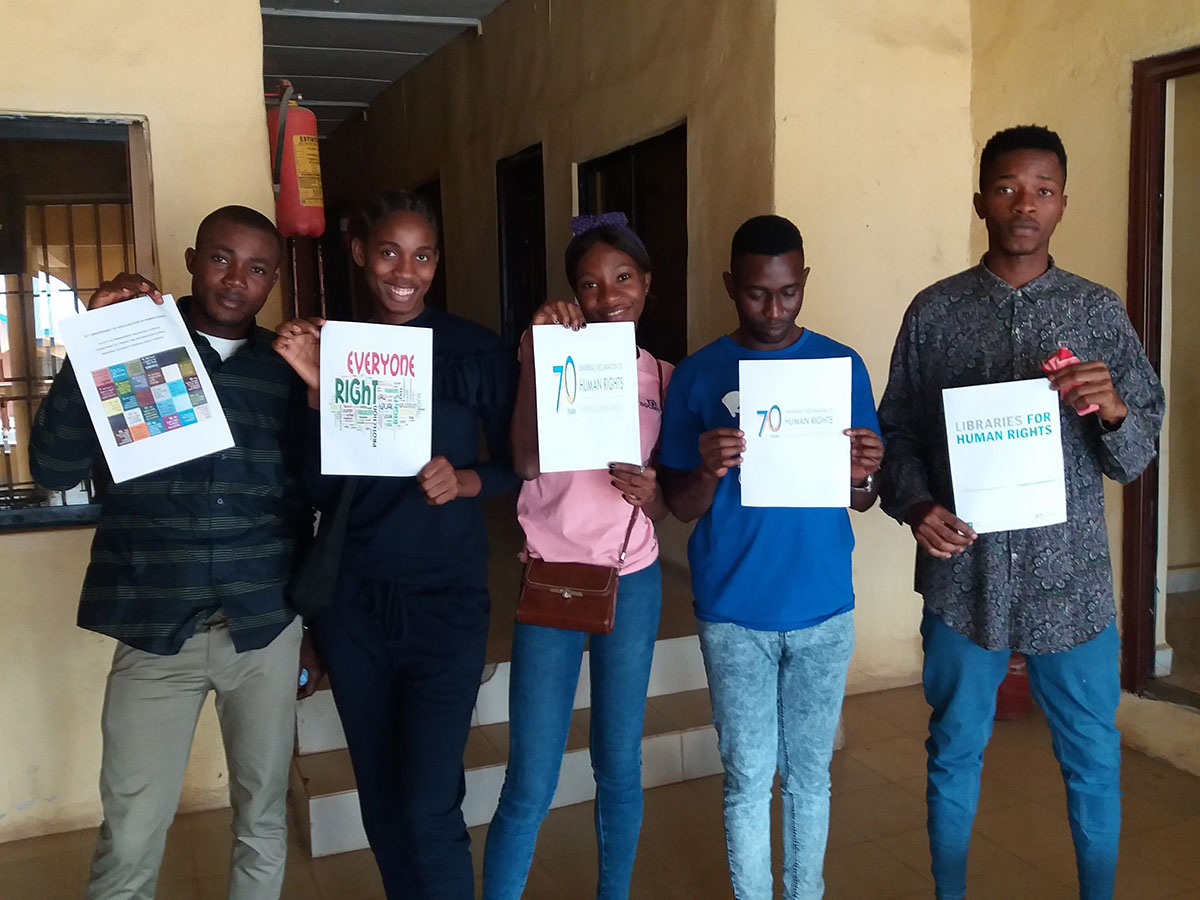
The Department of Library and Information Science, Madonna University, Nigeria has organised an interactive session to mark the anniversary of the Universal Declaration. Students, lecturers and the staff at the LIS Department all participated, using pictures depicting each of the rights as a basis for candid discussion. Participants shared the belief that everyone has the right to be served with information, irrespective of age, gender, sex, status, tribe, geographical location and position. The discussion focused on librarians stepping out and acting to include everyone in information services. This proved to be an engaging activity for the LIS students to learn more about human rights and the good practices of effective service delivery without discrimination.
POLAND
The Silesian Library in Katowice and the Polish Librarians’ Association have a partnership with the UN Information Centre in Warsaw to promote SDGs and support campaigns and events such as this celebration. One of the activities planned for Monday includeAdd Your Voice. Libraries in Poland will invite patrons and regular people, but also young leaders and experts and they will encourage them to read one article from the Declaration in their own native language. The recording will be sent to this UN platform while the videos will be published on social media with hashtag #StandUp4HumanRights.
UNITED ARAB EMIRATES
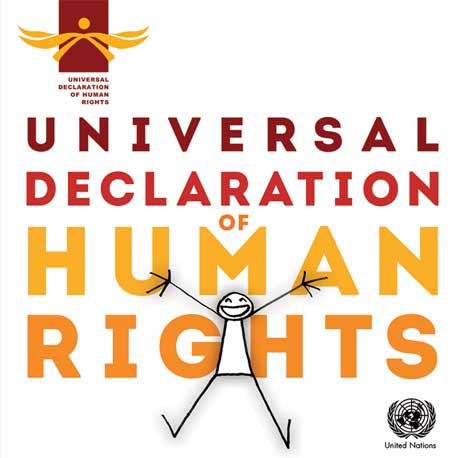
The Dubai Public Library has organised a series of events and activities to celebrate the anniversary of the Human Rights Declaration. Mr. Hamid Darwish, legal counsel and lawyer in Dubai, will introduce a lecture titled “Children’s Rights – The Law of Wadima ” He will also present and sign his own book “Children’s Rights” for the audience.
The Student Council from the New Academy School will join the celebrations and participate in the events that also include a reading of the terms of the Human Rights Declaration by students and library users and a Human Rights books exhibition in the reading corner of the library.
USA
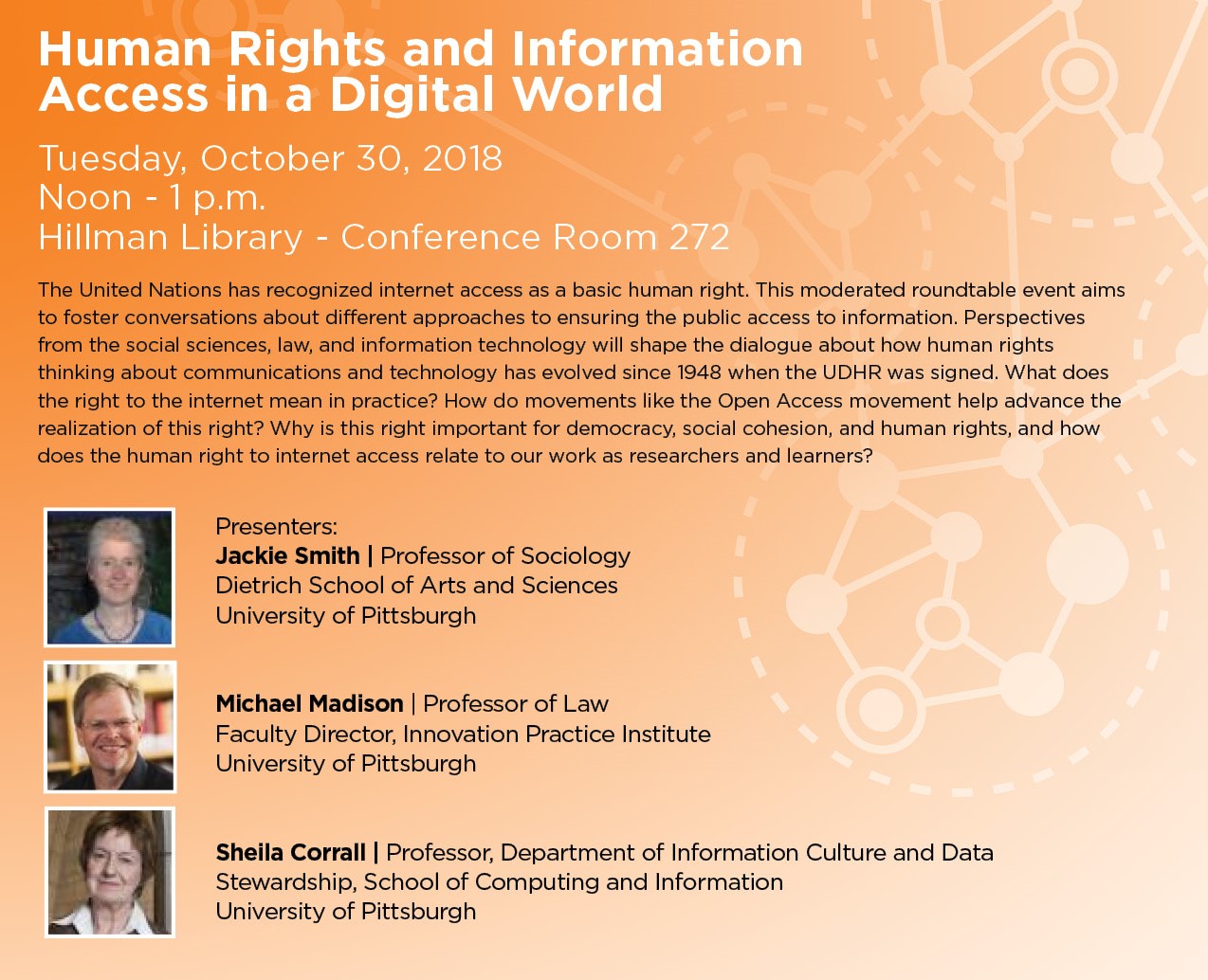
At the University of Pittsburgh, there have been several events called the UDHR at 70 Dialogue Series, organized primarily by Professor Jackie Smith at the Sociology Department. The University Library System has been co-organizing and co-sponsoring these events.
In particular, the library hosted a roundtable discussion on “Human Rights and Information Access in a Digital World” as part of Open Access Week 2018. The Dialogue Series is ongoing, and you can access the summary document here.
Publications, FAIFE (Committee on Freedom of Access to Information and Freedom of Expression), Access to information, Access to knowledge, Cultural heritage, Democracy, Human rights, Peace”
